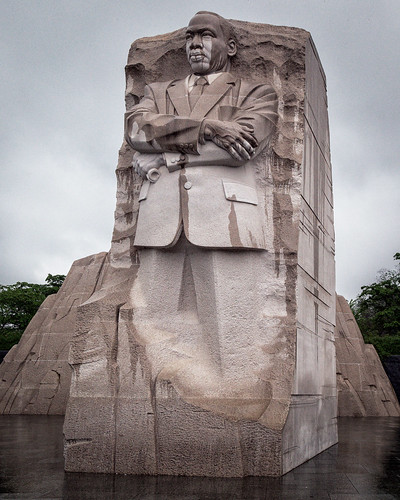 |
| Martin Luther King Memorial, Washington DC |
Those of us who remember, albeit vaguely, the era of Dr. Martin Luther King Jr., can perhaps be forgiven for wishing the whole racial equality thing settled, so we can move on to some other crisis, like poverty or world peace. One has only one attention span, after all. However, race refuses to settle, refuses to consign racism to a bygone and unlamented era, refuses to quit the stage of American politics.
 |
| Dr. Evelyn Carter, from evelynrcarter.com |
A lot of that has to do with how deeply wired race is to our ways of interpreting the world, says Dr. Evelyn Carter, a social psychologist with the diversity consulting firm Paradigm Strategy Inc. Race is part of the way we categorize people we meet, pre-consciously, so before our enlightened ideals have a chance to kick in our impressions of others are "auto-populated" with racial ideas, often of the rather unenlightened sort.
Dr. Carter spoke on Martin Luther King Jr Day in Cedar Rapids, in a morning celebration at Coe College and in the evening at St. Paul's United Methodist Church. (In between the two she ran a workshop at the public library.) Both talks were on the inadequacy of color-blindness as an ideal for navigating the world. She recognized the allure of color-blindness: people want to be seen as individuals not as stereotypes, and interracial conersations about race are inevitably stressful and exhausting. Whites don't want to say the wrong things, and blacks don't want to make themselves a target. So it's easier to avoid the subject.
Other studies show whites tend to over-focus on the progress made in race relations since the 1950s, which, while considerable, still falls far short of the equal opportunity the country promises. In 2016 median family wealth for whites was $171,000; for blacks it was $17,600 (Besette 2019). The disparate situations mean a world of difference in terms of access to health care, housing, travel, educational opportunities and internships, not to mention much greater vulnerability to any life setback. Not surprisingly, as a consequence, young African-Americans and Latinos are much more likely to live in poverty, drop out of school, and be unemployed (Besette 2019).
 |
| Dr. Carter speaking at St. Paul's UMC |
She concluded both talks by commending "frank conversations about race" as the only way to overcome the racial divide and begin to achieve some semblance of King's dream. She proclaimed herself an optimist, believing that these conversations can and will happen. She recommends:
- "Lean into the awkwardness." White people in particular should stop trying to prove their sympathy-likability ("peformance orientation") and try to learn as much as they can from the other person.
- "Remember that relationship can go a long way." The more time you spend with someone the more trust you build.
- Conversation can clarify what needs to be done (referencing Luke 10:37, Jesus said to him, 'Go and do likewise.')
Her wisdom and optimism are important antidotes to a racial scene in America that can seem intractable to the sympathetic white, not to mention downright dangerous to the black or Latinx.
 |
| Johnson STEAM Academy choir sang some lively tributes to Dr. King |
 |
| Ana M. Clymer, Cultural Equity Statewide Coordinator, accepting the Percy and Lileah Harris "Who is My Neighbor" Award (Fun fact: The Harrises were Dr. Carter's grandparents) |
SEE ALSO:
Camille Busette, "Our Day of Reckoning," Brookings, 12 January 2019Alison Gowans, "MLK Day Speaker, Granddaughter of Percy and Lileah Harris, Encourages Hard Conversations," Cedar Rapids Gazette, 20 January 2019
LAST YEAR'S POST: "Acting for Inclusion in a Fearful World," 16 January 2018 (also 2017 2015)




No comments:
Post a Comment